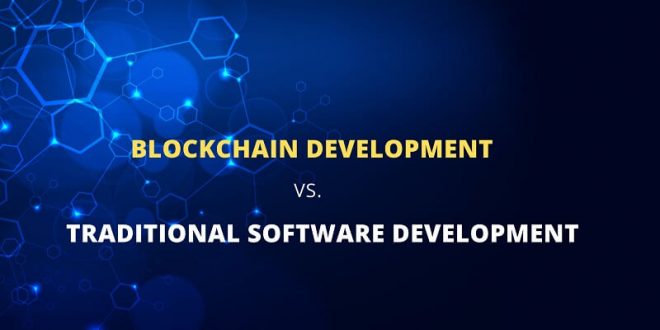Looking to understand the disparities between blockchain development vs traditional software development? This informative article compares the two, giving you valuable insights into their unique characteristics.
With many years of experience as a software developer, I have witnessed how technological advances are rapidly evolving. Blockchain technology is one of the most important changes in technology that I have witnessed. Notably, blockchain technology is transforming the way we conduct things, from transactions to identity management, and everything in between.
As a developer, it is essential to keep expanding your skillset with emerging technologies, and blockchain technology is an excellent place to start.
In this guide, we will explore the differences between blockchain development vs traditional software development.
We will discuss the basics of blockchain technology and its applications, assess the suitability of blockchain technology for your project, and the differences between blockchain and traditional software development.
We will also research the cost and timeline implications of blockchain development and compare the skills required for traditional software development and blockchain development.
Whether you are an entrepreneur or a developer exploring the possibilities of blockchain technology, this guide will help you understand the differences between blockchain development and traditional software development, and help you make informed decisions about your next steps. Let’s get started!
Understand the basics of blockchain technology and its applications
If you’ve been keeping up with the latest advancements in technology, then you have probably heard about blockchain technology and its applications. Understanding blockchain technology and how it works is essential if you’re interested in this rapidly growing sector.
Blockchain technology allows for digital information to be distributed but not copied. Its applications can be seen in multiple industries, such as finance, healthcare, and government. Transactions made with blockchain technology are secure, transparent, and tamper-proof, providing users with increased trust and confidence in the data.
When it comes to the difference between blockchain development and traditional software development, the primary distinction is the focus on decentralization.
Traditional software development is typically centralized, meaning it is created and managed by a single entity, while blockchain development is decentralized, meaning it is created and managed by a network of users. This distinction makes it easier to achieve transparency, immutability, and security.
As a result, if you would like to take advantage of the growing blockchain sector, understanding the basics of blockchain technology and its applications is crucial.
Spending time learning about technology will enable you to stay ahead in the ever-changing technological field.
Whether you are a professional developer or a casual user; a basic knowledge of blockchain technology can help you navigate and take advantage of its many benefits.
Assess The Suitability Of Blockchain Technology For Your Project
Developing software involves many different approaches. Many developers are exploring how blockchain technology can be applied to their projects as a result of its rise in recent years. However, before jumping on the blockchain bandwagon, you should assess whether it’s the right technology for your specific needs.
One of the key advantages of blockchain technology is that it enables the creation of secure, decentralized systems. This can be particularly useful for applications where there’s a need for trust and transparency, such as supply chain tracking digital voting systems. However, it’s worth noting that implementing a blockchain solution can be more complex than traditional software development, and can require specialist skills.
Another factor to consider is the scalability of blockchain technology. While it’s true that some blockchain-based applications have achieved impressive transaction volumes; the technology is still relatively new, and it’s not yet clear how it will scale as adoption increases. For some projects, traditional software development may still be the most practical approach.
A comprehensive assessment of your project’s needs is the first step toward deciding whether blockchain technology is a suitable solution.
By understanding the strengths and weaknesses of blockchain; you can make an informed decision that will help you to deliver a high-quality solution that meets your requirements.
Understand the differences between blockchain and traditional software development
Having a basic understanding of blockchain technology versus traditional software development is essential when software or investing in technology products. While many consumers and business leaders are aware blockchain is a hot technology; they may not be aware of the key differences between blockchain development and traditional software development.
Blockchain technology is a method of storing data in a decentralized, distributed ledger. It relies on a network of computers to process and verify transactions, offering heightened security, transparency, and immutability. On the other hand, traditional software development relies on a centralized server; which is controlled by a single entity or organization and utilizes a client-server architecture.
One of the main benefits of blockchain technology is the increased security it provides. Through its decentralized structure, blockchain is resistant to tampering and hacking attempts. Additionally, blockchain’s distributed nature enables a more transparent and accountable system of recordkeeping.
However, the greatest difference between blockchain and traditional software development may be the lack of a central authority in blockchain technology. This decentralized nature means that blockchain networks must reach a consensus before any transactions can be confirmed; which can lead to slower processing times in some cases.
Understanding these key differences between blockchain and traditional software development can help you make informed decisions when considering technology solutions. Whether you are a business leader or a consumer; this knowledge can make a big difference in terms of your technology investment.
Research The Cost And Timeline Implications Of Blockchain Development
If you’re considering incorporating blockchain into your business; there are a few things you need to know before diving in. One of the most important factors to consider is the cost and timeline of blockchain development.
Developing blockchain technology is not a cheap or quick process, and you’ll need to weigh up the costs to ensure it’s viable in your budget.
Estimating costs is key to developing a budget plan for your blockchain project. Once you’ve got it out of the way, it’s essential to create realistic timelines, outlining milestones, deadlines, and other significant events in your project’s development.
Doing your blockchain research will help you immensely in this regard. Blockchain technology isn’t simple, and you’ll need to educate yourself on the technical aspects of it to make better decisions. Gathering as much information will also make your communication with developers more efficient and transparent.
To come to a wise decision, it is imperative to conduct a thorough cost and timeline analysis before diving into blockchain development. Your research will help you get a feeling for the cost; the type of resources required, and other critical factors that will impact your project’s success. With that in mind, you can confidently work with blockchain developers and take your project to the next level.
Compare The Skills Required For Traditional Software Development And Blockchain Development
There are major differences between traditional software development and blockchain development. You have to understand the skills required for each type of development and make an informed decision. I’ve had some experience in both areas and I’m happy to share my thoughts.
Traditional software development involves building a program or system that runs locally on a device or server. Typically, these programs use standard programming languages such as Java, Python, and C++.
Developers who specialize in traditional software work on coding, testing, debugging, and maintaining software programs. They may need strong analytical and problem-solving skills; as well as experience with development tools like IDEs and source control systems.
Blockchain development, on the other hand, requires a different skill set. Blockchain is a distributed ledger technology that allows for secure and transparent transactions. Developers in this area need to be familiar with specific blockchain platforms such as Ethereum or Hyperledger Fabric.
They also need to be able to write smart contracts that run on top of the blockchain and create decentralized applications (dApps). This requires knowledge of blockchain-specific languages like Solidity and web3.js.
Blockchain development is more complex than traditional software development in terms of needed skills, including cryptography, familiarity with consensus mechanisms, and a comprehension of how decentralized systems operate.
To make the best decision for your software needs; it’s important to compare the competencies of traditional software developers and blockchain developers.
Conclusion
To assess the suitability of blockchain development for your project; it is essential to understand the basics of blockchain technology and its applications; as blockchain development differs significantly from traditional software development.
Before committing to blockchain development, it is imperative to understand the cost and timeline implications.
Hope, this guide helps you make the right decision and makes it a must-read for anyone looking to improve their life through innovative technology.
By understanding these differences, you can make an informed decision about which approach is best for your long-term goals and ultimately help you achieve success.
 Free Web Resources , psd, mockups, & web templates Best WordPress Themes & Best Html Templates
Free Web Resources , psd, mockups, & web templates Best WordPress Themes & Best Html Templates








